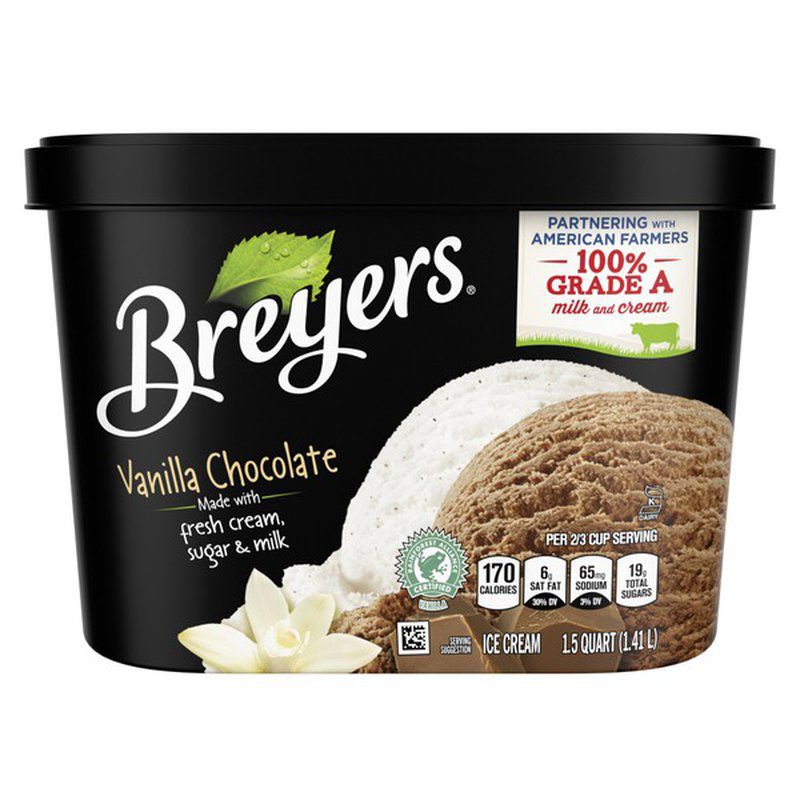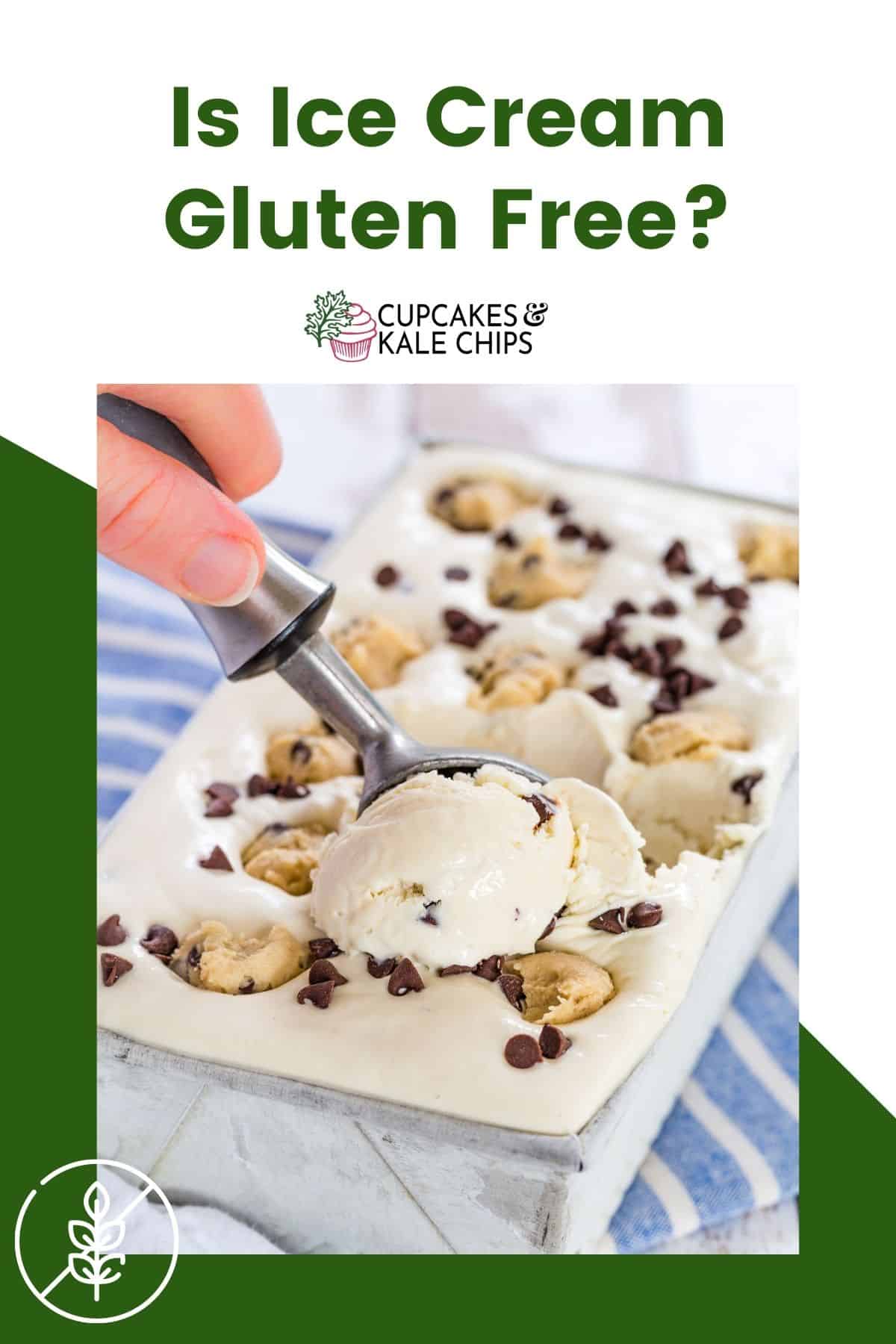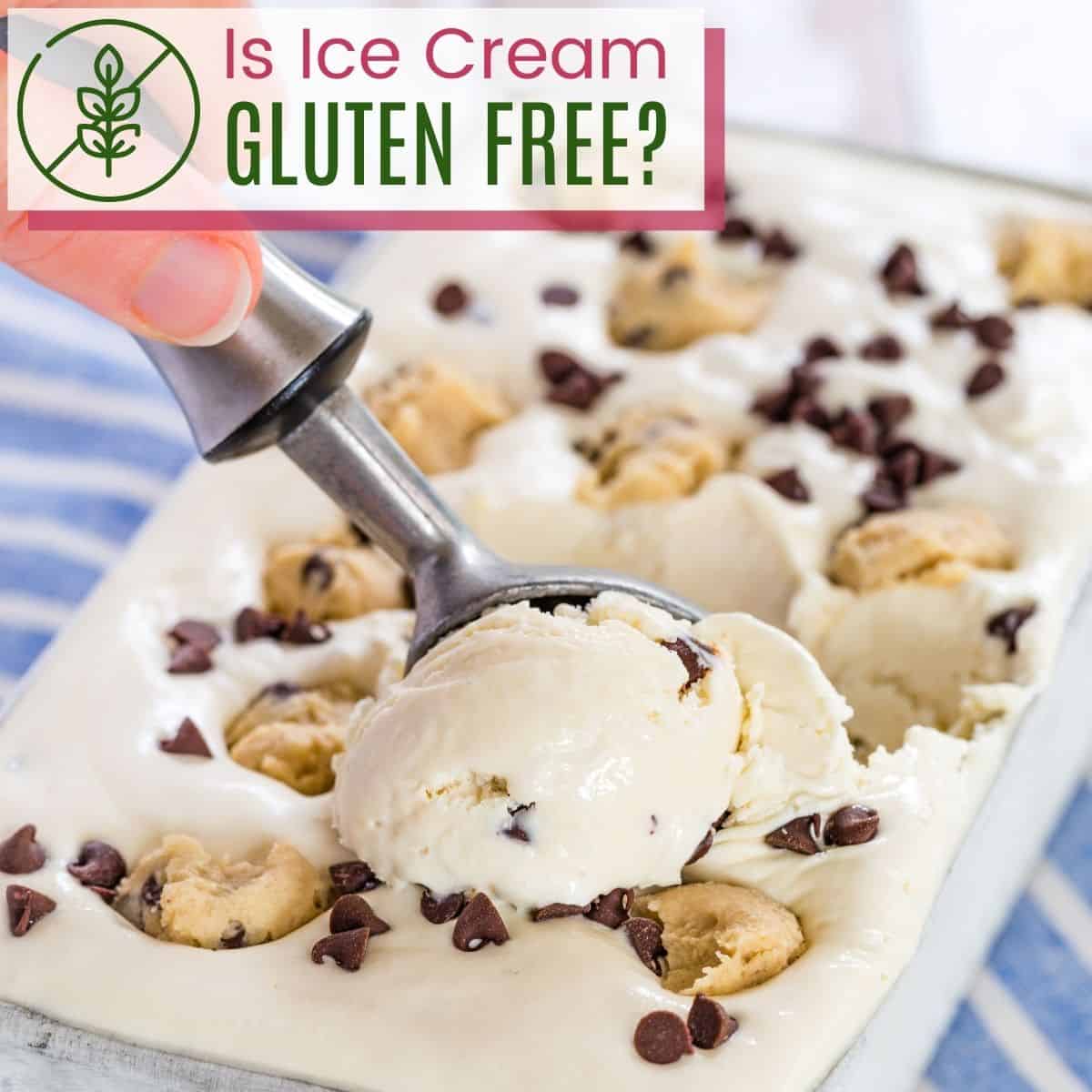What Is Gluten And Why Is It A Concern In Ice Cream?

Gluten is a protein found in wheat, barley, and rye. It is responsible for giving dough its elasticity and helps it rise during baking. For individuals with gluten sensitivity or celiac disease, consuming gluten can trigger an immune response and cause damage to the small intestine. While milk and cream are naturally gluten-free, ice cream can become a concern for those with gluten sensitivity due to potential sources of gluten in the flavorings, thickeners, colorings, and additives. It is important for individuals with gluten sensitivity to carefully read labels and choose certified gluten-free ice cream options to avoid any potential adverse reactions.
I Introduction To Gluten And Its Effects On Health
Gluten is a protein found in wheat, barley, and rye and is a common ingredient in many foods. For individuals with gluten sensitivity or celiac disease, consuming gluten can lead to various health issues. When people with celiac disease consume gluten, their immune system reacts and causes damage to the small intestine, leading to digestive problems, nutrient deficiencies, and other symptoms. Even for those without celiac disease, gluten sensitivity can cause similar symptoms, such as bloating, diarrhea, and fatigue. It is important for those with gluten sensitivity to understand the potential effects of gluten on their health and make informed choices about their diet.
II Why Gluten May Be A Concern For Individuals With Gluten Sensitivity Or Celiac Disease
For individuals with gluten sensitivity or celiac disease, gluten can be a major concern. Celiac disease is an autoimmune disorder where the consumption of gluten triggers an immune response, damaging the small intestine and causing various health issues. Even a tiny amount of gluten can cause significant damage and lead to symptoms such as abdominal pain, diarrhea, and nutrient deficiencies. People with gluten sensitivity may experience similar symptoms but without the autoimmune response. It is crucial for individuals with gluten sensitivity or celiac disease to avoid gluten-containing foods, including ice cream, to maintain their health and well-being.
Ice Cream Ingredients And Gluten Content

Ice cream is typically made with a few main ingredients, such as milk, cream, sugar, and flavorings. While these ingredients are naturally gluten-free, there are some potential sources of gluten in ice cream. Some flavorings, mix-ins, or toppings may contain gluten, such as cookies, cookie dough, or brownie pieces. Additionally, some ice cream manufacturers may use additives or stabilizers that contain gluten. Therefore, it is important to carefully read the ingredient labels or look for gluten-free certifications when choosing ice cream to ensure it is safe for individuals with gluten sensitivity or celiac disease.
I Overview Of Common Ingredients In Ice Cream
Ice cream is typically made with a few main ingredients, such as milk, cream, sugar, and flavorings. These ingredients are naturally gluten-free. The milk and cream provide a creamy base, while the sugar sweetens the ice cream. Flavorings can range from vanilla and chocolate to fruits, nuts, or coffee. Additionally, some ice cream recipes may include stabilizers or emulsifiers to enhance texture and prevent ice crystals from forming. It is important to note that while these common ingredients are gluten-free, it is essential to read the labels or look for gluten-free certifications to ensure that there are no hidden sources of gluten in the ice cream.
II Potential Sources Of Gluten In Ice Cream
Potential sources of gluten in ice cream include certain additives, flavorings, and toppings. Some common ingredients that may contain gluten include:
- Stabilizers and thickeners: Certain stabilizers and thickeners, such as modified food starch or maltodextrin, may be derived from gluten-containing grains like wheat.
- Flavorings and syrups: Some flavorings or syrups used in ice cream, such as barley malt syrup or cookie dough, may contain gluten.
- Toppings and mix-ins: If the ice cream includes toppings or mix-ins like cookies, brownies, or cereal, these ingredients may contain gluten.
To ensure the ice cream is gluten-free, it is important to carefully read the ingredient list and look for gluten-free certifications on the packaging.
Gluten-free Ice Cream Brands And Options

When it comes to gluten-free ice cream options, there are several brands to choose from. Many popular ice cream brands now offer gluten-free varieties, clearly labeling them as such. Some certified gluten-free ice cream brands include Häagen-Dazs, Talenti, Ben & Jerry’s, and So Delicious. These brands offer a wide range of flavors, including classic favorites like chocolate and vanilla, as well as unique options such as dairy-free and vegan ice creams. Additionally, there are alternative options for those who prefer homemade or artisanal gluten-free ice creams, which can be found at specialty stores or made at home using gluten-free recipes.
I Certified Gluten-free Ice Cream Brands
Several ice cream brands offer certified gluten-free options, providing a safe and delicious treat for individuals with gluten sensitivities or celiac disease. Some popular certified gluten-free ice cream brands include Häagen-Dazs, Talenti, Ben & Jerry’s, and So Delicious. These brands have undergone rigorous testing and meet the strict standards set by gluten-free certification organizations. By choosing certified gluten-free ice cream brands, individuals can confidently enjoy their favorite flavors without worrying about gluten contamination. It’s important to always check the packaging or the brand’s official website for gluten-free certification logos to ensure product safety. [13]
II Alternative Options For Gluten-free Ice Cream
There are many alternative options for individuals who are looking for gluten-free ice cream. One popular option is sorbet, which is made from fruit and sugar and does not contain any gluten-containing ingredients. Another option is coconut milk-based ice cream, which provides a creamy and delicious alternative for those who cannot consume dairy. Additionally, there are also almond milk, soy milk, and rice milk-based ice creams available on the market. These alternatives offer a variety of flavors and options for individuals with gluten sensitivities or celiac disease. It’s important to read the labels carefully to ensure that these alternatives are certified gluten-free.
Understanding Labeling And Cross-contamination Risks

When it comes to enjoying ice cream on a gluten-free diet, understanding labeling and cross-contamination risks is crucial. Reading labels carefully is a must, as manufacturers are required to disclose any potential sources of gluten in their products. Look for certifications or labels that indicate that the ice cream is gluten-free. However, it’s important to note that cross-contamination can occur during the manufacturing process, especially if the same equipment is used to process gluten-containing products. To minimize the risk of cross-contamination, individuals with gluten sensitivity should look for ice creams that are produced in dedicated gluten-free facilities or have strict cross-contamination prevention measures in place.
I Reading Labels For Gluten-free Certification
When it comes to finding gluten-free ice cream, it’s important to carefully read the labels for gluten-free certification. Look for symbols or statements on the packaging that indicate that the ice cream is certified gluten-free. These certifications assure consumers that the product has been tested and meets specific gluten-free standards. Common certifications include the Gluten-Free Certification Organization (GFCO) and the Celiac Support Association (CSA). By choosing products with these certifications, individuals with gluten sensitivity can have peace of mind knowing that their ice cream is safe to consume.
II Cross-contamination Risks And Precautions
Cross-contamination can be a concern when it comes to gluten-free ice cream. Despite efforts to ensure that ice cream is made with gluten-free ingredients, there is still a risk of cross-contamination during the manufacturing process. This can occur if the same equipment is used to produce both gluten-containing and gluten-free products, or if there is insufficient cleaning between batches. To minimize these risks, it is important to choose ice cream brands that have strict manufacturing practices in place to prevent cross-contamination. Additionally, individuals with gluten sensitivity should be cautious when consuming ice cream from establishments that also serve gluten-containing products to reduce the risk of accidental exposure.
How To Enjoy Ice Cream Safely On A Gluten-free Diet

When it comes to enjoying ice cream on a gluten-free diet, there are a few tips to keep in mind. First, always check the label to ensure that the ice cream is certified gluten-free. Look for brands that have strict manufacturing practices in place to prevent cross-contamination. Additionally, be cautious when ordering ice cream from establishments that also serve gluten-containing products, as there is a risk of cross-contamination. Finally, opt for flavors that are less likely to contain gluten-based additives or toppings. By following these precautions, individuals on a gluten-free diet can safely enjoy their favorite frozen treat.
I Tips For Identifying Gluten-free Ice Cream Flavors
When looking for gluten-free ice cream flavors, it’s important to read the ingredient list carefully. Look for flavors that are made with natural ingredients and don’t contain any gluten-containing additives or flavorings. Avoid flavors like cookies and cream, brownie, or cake batter, as these often contain gluten-based ingredients. Instead, opt for plain single flavors like strawberry, vanilla, or chocolate, which are more likely to be gluten-free. Additionally, you can inquire with the brand or manufacturer about their gluten-free certification or manufacturing practices to ensure the ice cream is safe for consumption.
II Best Practices For Avoiding Gluten Cross-contamination While Enjoying Ice Cream
When enjoying ice cream on a gluten-free diet, it is important to follow best practices to avoid cross-contamination. Here are some tips to help ensure a safe experience:
- Use dedicated utensils: Use clean utensils specifically designated for gluten-free foods to prevent any cross-contamination from gluten-containing foods.
- Scoop from a fresh container: When serving ice cream, scoop from a fresh container rather than a shared container that may have come into contact with gluten-containing ingredients.
- Be cautious at self-serve stations: If you’re getting ice cream from a self-serve station, be careful to avoid any toppings or mix-ins that may contain gluten. Stick to safe options like fresh fruit or plain sauces.
- Clean surfaces and equipment: If you’re making homemade ice cream, make sure to thoroughly clean all surfaces and equipment to remove any traces of gluten.
By following these best practices, you can enjoy your gluten-free ice cream without the risk of cross-contamination.
Conclusion

In conclusion, while ice cream can be gluten-free, it is important to read labels and understand the risks of cross-contamination. By checking the ingredient list and looking for gluten-free certification, individuals with gluten sensitivity can enjoy ice cream without compromising their dietary restrictions. It is also crucial to be cautious of possible cross-contamination in shared manufacturing facilities or during preparation. By staying informed and following best practices, individuals can indulge in the deliciousness of ice cream while maintaining a gluten-free lifestyle.
I Summary Of Gluten Content In Ice Cream And Considerations For Individuals With Gluten Sensitivity
In summary, individuals with gluten sensitivity should be cautious when consuming ice cream. While many single flavor ice creams are gluten-free, it is important to carefully review the ingredient list for any additives or flavorings that may contain gluten. Look for the words “gluten-free” or gluten-free certifications on ice cream packaging to ensure its safety. Cross-contamination is also a concern, so it is advisable to choose ice cream brands that have strict manufacturing practices to prevent gluten contamination. By staying informed and making informed choices, individuals with gluten sensitivity can enjoy ice cream without compromising their dietary restrictions.
II Enjoying Ice Cream Without Compromising Dietary Restrictions
When it comes to enjoying ice cream without compromising dietary restrictions, there are a few tips to keep in mind. Firstly, always read the labels of ice cream products to ensure they are certified gluten-free. Look for specific allergen statements or gluten-free certifications. Additionally, be cautious of cross-contamination risks by choosing ice cream brands with strict manufacturing practices. Consider using dedicated utensils and containers to prevent any potential gluten contamination. Lastly, if dining out, ask the server about any gluten-free options or if they have specific protocols in place for gluten-sensitive individuals. By being proactive and making informed choices, individuals with gluten sensitivity can safely indulge in their favorite frozen treat.
Frequently Asked Questions About Gluten-Free Ice Cream
Q: Is ice cream generally gluten-free?
A: Not all ice creams are gluten-free, as some may contain gluten-containing ingredients. However, there are many gluten-free ice creams available in the market.
Q: What is gluten?
A: Gluten is a protein found in wheat, barley, and rye. It can cause an immune reaction in people with celiac disease or gluten sensitivity.
Q: What ingredients should I look for in ice cream to determine if it’s gluten-free?
A: It is important to read the ingredient list carefully. Some common gluten-containing ingredients in ice cream include cookies, brownies, cake pieces, cookie dough, and certain flavored syrups. Look out for any potential sources of gluten, such as wheat flour or malt extract.
Q: Are there any ice cream flavors that are more likely to be gluten-free?
A: Basic flavors like vanilla, chocolate, and strawberry are more likely to be gluten-free as they typically contain simple ingredients. However, it’s always best to check the manufacturer’s labeling or contact them directly to be certain.
Q: How can I be sure that an ice cream is gluten-free?
A: Look for ice creams labeled specifically as “gluten-free” by the manufacturer. This indicates that the product has been tested and confirmed to contain no gluten or very minimal traces. Alternatively, you can contact the manufacturer for more information or search for gluten-free certifications on the packaging.
Q: Can cross-contamination occur in ice cream production facilities?
A: Yes, cross-contamination is possible in shared facilities where gluten-containing ingredients are processed. Some manufacturers have strict protocols to prevent cross-contamination, while others may not. If you have severe gluten intolerance or celiac disease, it’s best to choose products that are specifically labeled as “gluten-free” and produced in dedicated gluten-free facilities.
Q: Can I make my own gluten-free ice cream at home?
A: Absolutely! Making gluten-free ice cream at home is a great way to ensure its safety. Use gluten-free ingredients and avoid cross-contamination with gluten-containing products.
Q: Are sorbets and sherbets gluten-free?
A: Sorbets and sherbets are typically gluten-free, as they are made primarily with fruit juice or puree, sugar, and water. However, it is still recommended to check the ingredient list for any potential sources of gluten.
Q: Where can I find gluten-free ice cream options?
A: Many grocery stores offer a variety of gluten-free ice cream options in their freezer section. Additionally, specialty health food stores may have a wider selection. Online retailers also offer a range of gluten-free ice creams that can be conveniently delivered to your doorstep.
Remember, if you have any doubts about the gluten content of a specific ice cream, reach out to the manufacturer for verification. It’s always better to be safe and enjoy your icy treat without worries!

Soo Good Snack Bar is an upscale snack shop located at 1309 Hermosa Ave. in Hermosa Beach, CA. This family-owned business is the newest addition to the community of Hermosa, and our goal is to create a fun and inviting place where families can enjoy delicious snack foods that fit the beach lifestyle. Check us out today and help yourself to happiness.
